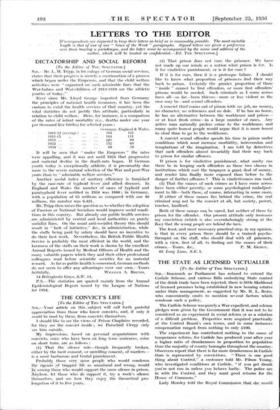THE CONVICT'S LIFE
[To the Editor of THE SPECTATOR.]
Sm,—Your article on this • subject will call forth grateful . • . appreciation from those who know convicts, and, if only . it could be read by them, from convicts themselves.. Ishould like to see the views Of Prison_ Chaplains recorded, for they see the 'convict inside ; we liarochial Clergy only see him outside.
My impressions, lbaecl on personal acquaintance with 'convicts, since who hive been on iong term sentences, some on' short term, are as follows :
(1) That the- silence b
freq rule—though frequently broken, ,
either by the tacit consent, or unwilling consent, of warders— is a most bartiarnus and 'brutal punishment. Probably those. Very same peoPte who would condemn the rigours . of Irappist life as unnatural and wrong, would pe.aniong those who would support the same silence in prison. AnyhoW, let those who do support It try a week's silence themselves, and see how they enjoy the theoretical pro- longation of it to five years.
(2) That prison does not cure the prisoner. We have not made up our minds as a nation what prison is for. Is it for vindictive punishment, or is it for cure ?
If it is for cure, then it is a grotesque failure. I should like to know -what proportion of prisoner& find their way back to prison. Certainly the greater, proportion of those " inside cannot be first offenders, or more first offenders' prisons would be needed. Such criminals as I come across have all—so far—been thieves—more or less violent as the case may be-and sexual offenders.
A convict thief comes out of prison with no job, no money, inO character, no references and no dole. If he has no home, he has no alteinative between the work-house and prison— or at least fresh crime—in a large number of cases. Any active man naturally prefers crime to the workhouse, and many quite honest people would argue that it is more honest to steal than to go to the workhouse.
A convict sexual offender spends his time in prison under conditions which must increase morbidity, introversion and temptations of the imagination. I am told by detectives that such offenders almost invariably fmd their way back to prison for gun lar offences.
If prison is for vindictive punishment,1 what sanity can there be in keeping such offenders as these two classea in institutions which cost the taxpayer a grpak deal of money, and render him finally more exposed than before to the danger of further ;offences ? This is vindictiveness run mad.
(3) That the causes of such crimes as I have come across have been either poverty, or some psychological maladjust- ment to life—both these, of course, interacting in some cases.
If either of these causes lies behind the crime, the real criminal may not be the convict at all, but society, parent, teacher, landlord.
Both of these causes cam be cured, but neither of them by prison for the offender. Our present attitude only increases my conviction (which is also overwhelmingly strong at the Zoo) that the wrong people are behind the bars.
The least, and most necessary practical step, in my opinion, _is that in every prison there should be a trained psycho- therapist on the staff, who should deal with all prisoners, with a view, first of all, to finding out the causes of their


















































 Previous page
Previous page